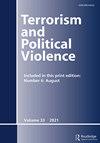Moving into Terrorism: How Climate-Induced Rural-Urban Migration May Increase the Risk of Terrorism
IF 2.1
2区 社会学
Q1 INTERNATIONAL RELATIONS
引用次数: 2
Abstract
ABSTRACT How can we expect climate change to affect terrorism? Research on climate-conflict links argues that climate and conflict are unlikely to exhibit a direct relationship. Instead, these links are likely to be indirect, often through negative shocks to agriculture. Even then, politics remains a far stronger influence on conflict than climate. Terrorism appears particularly unlikely to be directly linked to climate change, since climate change disproportionately affects rural areas and terrorism disproportionately affects urban areas. Yet, we argue that there is a process through which climate change could increase the risk of terrorism. This process involves failure to adapt in rural areas, rural-urban migration, and then a failure of cities to incorporate new population influxes. Meanwhile, rural-urban migration is likely to trigger path-dependent urbanization processes that will increase the share of the world’s population living near country borders. We expect this process to increase the motivation and opportunity for terrorism as climate change continues. Policies that help rural areas adapt through new livelihood strategies and cities adapt to large population influxes are critical to reducing this threat.走向恐怖主义:气候导致的农村-城市移民如何增加恐怖主义的风险
气候变化如何影响恐怖主义?关于气候冲突联系的研究认为,气候和冲突不太可能表现出直接关系。相反,这些联系可能是间接的,通常是通过对农业的负面冲击。即便如此,政治对冲突的影响仍然比气候大得多。恐怖主义似乎特别不可能与气候变化直接相关,因为气候变化对农村地区的影响尤为严重,而恐怖主义对城市地区的影响尤为严重。然而,我们认为,气候变化可能会增加恐怖主义的风险,这是一个过程。这一过程包括农村地区未能适应,农村向城市迁移,然后城市未能吸收新的人口流入。与此同时,农村向城市的移徙可能引发依赖路径的城市化进程,这将增加居住在国家边界附近的世界人口比例。我们预计,随着气候变化的持续,这一进程将增加恐怖主义的动机和机会。帮助农村地区通过新的生计战略和帮助城市适应大量人口流入的政策,对于减少这一威胁至关重要。
本文章由计算机程序翻译,如有差异,请以英文原文为准。
求助全文
约1分钟内获得全文
求助全文
来源期刊

Terrorism and Political Violence
Multiple-
CiteScore
5.60
自引率
8.30%
发文量
87
期刊介绍:
Terrorism and Political Violence advances scholarship on a broad range of issues associated with terrorism and political violence, including subjects such as: the political meaning of terrorist activity, violence by rebels and by states, the links between political violence and organized crime, protest, rebellion, revolution, the influence of social networks, and the impact on human rights. The journal draws upon many disciplines and theoretical perspectives as well as comparative approaches to provide some of the most groundbreaking work in a field that has hitherto lacked rigour. Terrorism and Political Violence features symposia and edited volumes to cover an important topic in depth. Subjects have included: terrorism and public policy; religion and violence; political parties and terrorism; technology and terrorism; and right-wing terrorism. The journal is essential reading for all academics, decision-makers, and security specialists concerned with understanding political violence.
 求助内容:
求助内容: 应助结果提醒方式:
应助结果提醒方式:


